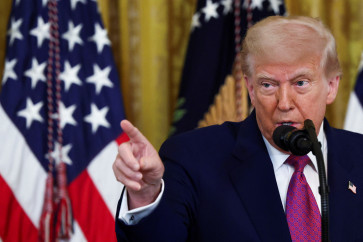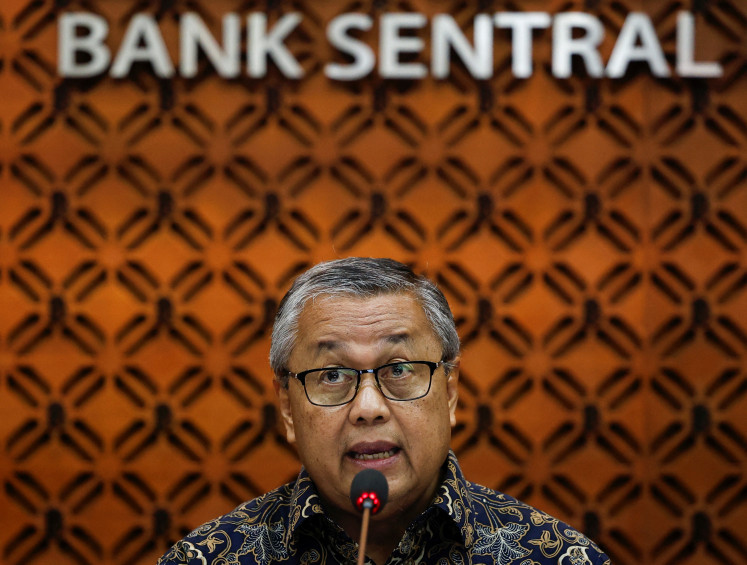Popular Reads
Top Results
Can't find what you're looking for?
View all search resultsPopular Reads
Top Results
Can't find what you're looking for?
View all search resultsDespite court ruling, native faith followers still lack proper IDs
Palmijaya shows five identification cards belonging to his friends back in South Kalimantan
Change text size
Gift Premium Articles
to Anyone
P
almijaya shows five identification cards belonging to his friends back in South Kalimantan. He points out something interesting in the cards in his hands. The religion spaces in some cards are left blank, while others are filled with one of the six official religions acknowledged by the state.
This would indicate that the holders either don’t have a religion or that they are followers of one of the recognized official religions.
“But one thing is for sure, all of them are adherents of Kaharingan,” Palmijaya, who is head of the South Kalimantan branch of the Indigenous Peoples Alliance of the Archipelago (AMAN) told The Jakarta Post in Minahasa, North Sulawesi, recently.
Kaharingan is an ancient belief of many Dayak tribespeople, and which existed for hundreds of years before the mainstream religions arrived. There are more than 100,000 Kaharingan followers in the various provinces of Kalimantan.
Many of the followers have chosen to convert to one of the six official religions, Islam, Christianity, Catholicism, Buddhism, Hinduism or Confucianism, or simply put one of those religions in their ID cards in order to make their lives easier.
That is what Palmijaya and his family opted for.
“My parents converted to Catholicism when I was young. They did it so I could go to elementary school,” he said.
Many families made the decision for the sake of their children’s future. Not only to facilitate the children going to school, having an official religion in their ID also gives them the opportunity to become civil servants or members of the police or the Indonesian Military (TNI).
However, not everyone practices the religion to which they have converted, Palmijaya added.
Gilung, another member of AMAN, also said he never practiced Islam as he is still very much an adherent of Langkah Lama, an ancient belief practiced by the Talang Mamak community in Indragiri Hulu regency in Riau province.
“We are cursed by the community and the social agency, you know, they say we will never go to heaven,” said the farmer from Rakit Kulim subdistrict.
Followers of the native faith do not have marriage certificates as their wedding ceremonies are held under their own rituals based on their spiritual beliefs. This has resulted in their children not getting birth certificates, which hampers them in accessing higher education.
There are around 10,000 followers of the native faith in his subdistrict alone, according to Gilung, who believes there are more spread across the province.
Both Palmijaya and Gilung have pinned their hopes on the landmark ruling issued by the Constitutional Court in November last year granting the petition of native faith followers to have their beliefs officially recognized by the government. Still, no significant progress has been made, nearly five months after the ruling. The ruling had boosted the indigenous communities’ confidence that they would not need to leave the religion space blank or choose one of the established religions.
The Home Ministry recorded in 2014 that there were around 959 native belief groups, with around 9.9 million followers spread across the archipelago.
Zudan Arif Fakrulloh, the director general of the ministry’s population and civil registration division, said the follow-up to the ruling awaited synchronization among government institutions.
“It’s in the finalization phase. We are still waiting for the limited Cabinet meeting,” he told the Post by text message on Monday.
There had been protests by mainstream religious groups such as the Indonesian Ulema Council (MUI), which opposed the ruling claiming that native faiths were different from religions. The MUI had also suggested the government provide special ID cards for native faith followers
Abdi Akbar, AMAN’s director of expansion of the Indigenous Peoples’ Political Participation, said the stalled progress showed reluctance by the government to follow up on the court ruling.
“This will not only have an impact on the fulfillment of their basic rights to education and health, but also obstruct their right to vote in the upcoming elections,” Abdi added.
AMAN has warned that around 3 million indigenous people across Indonesia might not be able to elect their leaders in the 2018 regional elections and 2019 presidential election because they still do not have e-ID cards.










